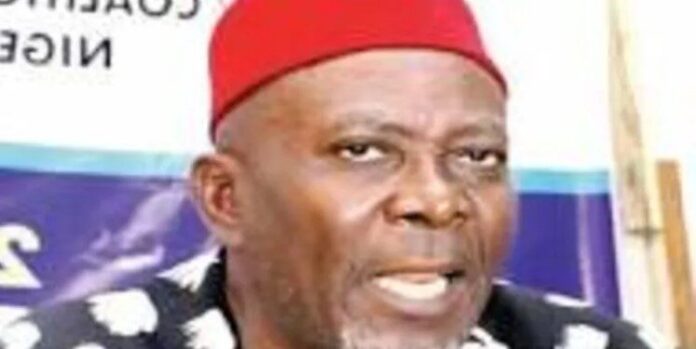A dramatic tussle for leadership has engulfed Ohanaeze Ndigbo, the apex Igbo socio-cultural organization, as Uche Okwukwu, a former Secretary-General of the group, declared himself the duly elected President-General. This development comes amid the emergence of another factional leader, Senator John Azuta-Mbata, leading to confusion and division within the group.
The controversy took center stage after two parallel elections were held in different states—Port Harcourt, Rivers State, and Enugu, Enugu State—resulting in the selection of two Presidents-General. Okwukwu claims the election in Port Harcourt adhered to the organization’s traditions, while dismissing the Enugu election as illegitimate.
In a televised interview on Arise TV, Okwukwu vehemently defended his position, asserting that his election followed the rotational leadership system practiced by Ohanaeze. He explained that the presidency rotates among states, with each state hosting the election when its turn comes.
“In 2017, the election was held in Enugu because the President-General was from Enugu. Similarly, in 2021, Imo State hosted the election because it was their turn. For 2025, it was the turn of Rivers State, and the election took place in Port Harcourt,” Okwukwu stated confidently.
He further criticized the election held in Enugu, alleging it violated Ohanaeze’s traditions and lacked transparency. “You don’t hold an election in a government house. It’s against our tradition. Delegates need free access, not a caged environment,” he said.
On the other side of the divide, Senator John Azuta-Mbata was declared President-General in an election conducted in Enugu. While Azuta-Mbata’s camp is yet to publicly address Okwukwu’s claims, the dual elections have already triggered concerns about the unity and future of Ohanaeze Ndigbo.
The elections in Enugu were reportedly held with the backing of influential figures within the organization, but Okwukwu’s faction has dismissed the process as politically motivated.
Adding another layer of complexity, Okwukwu has garnered the support of the Indigenous People of Biafra (IPOB), a controversial separatist group advocating for an independent Biafran state. While IPOB’s endorsement could boost Okwukwu’s influence among certain factions of the Igbo population, it also risks alienating other stakeholders wary of the group’s polarizing reputation.
Critics argue that IPOB’s involvement could further fracture Ohanaeze’s already delicate unity. “This isn’t just about Ohanaeze; it’s about the future of Igbo leadership,” said a political analyst who wished to remain anonymous. “Involving IPOB could turn this into a proxy battle for broader ideological conflicts.”
Ohanaeze Ndigbo has long been regarded as the cultural and political voice of the Igbo people, advocating for their interests in Nigeria’s socio-political landscape. Its leadership transitions have traditionally followed a rotational system designed to ensure inclusivity among the states in the Southeast and South-South geopolitical zones with significant Igbo populations.
However, disputes during leadership elections are not new to Ohanaeze. Past elections have witnessed similar controversies, with factions forming around political allegiances and regional loyalties. The current crisis, however, appears more pronounced due to the parallel elections and IPOB’s involvement.
The leadership tussle poses significant risks to Ohanaeze’s credibility and ability to unify the Igbo people. With Nigeria approaching another critical election cycle, a divided Ohanaeze could weaken the group’s influence in negotiating for political and economic interests.
Amid the unfolding drama, there have been growing calls for reconciliation and a transparent resolution process. Some stakeholders have suggested convening an emergency meeting of Ohanaeze’s elders’ council to mediate between the factions and restore order.
As the dust settles, both factions face mounting pressure to present evidence supporting their claims of legitimacy. Legal challenges may also arise, with each side seeking court validation of their election. Meanwhile, ordinary members of Ohanaeze and the wider Igbo community are left wondering who truly represents their voice.
For Uche Okwukwu, the fight is far from over. “I am the duly elected President-General of Ohanaeze Ndigbo. I will not be intimidated or silenced,” he declared. Whether his claim withstands scrutiny remains to be seen, but one thing is clear: the road to unity will be a challenging one for Ohanaeze Ndigbo.

